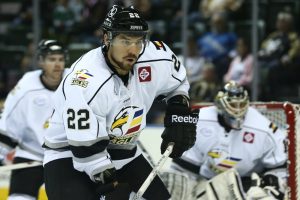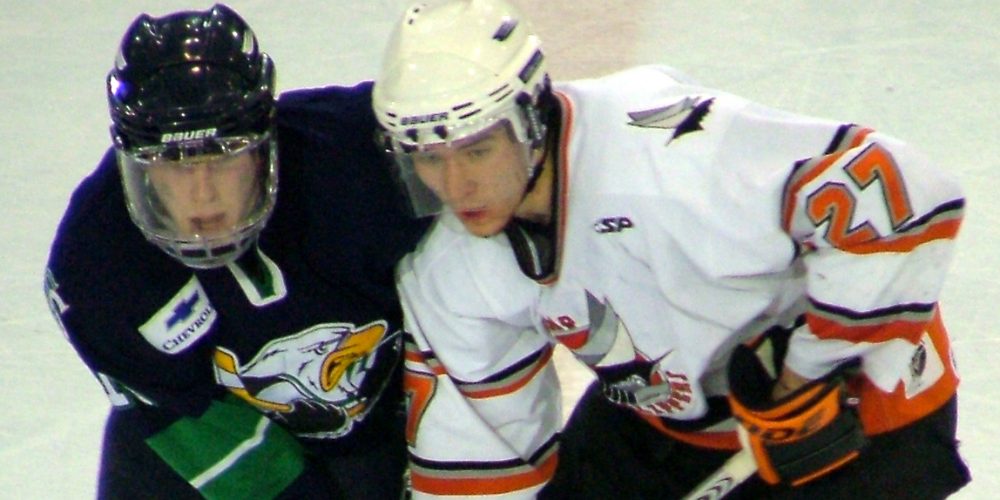For every team that has captured the Fred Page Cup, there is always a player considered a diamond in the rough.

In the case of the 2003-04 Nanaimo Clippers, that player was Raymond Sawada.
The power-forward from Richmond, BC proved to be a difference maker under legendary bench boss Bill Bestwick.
Sawada’s offensive prowess and physical presence turned out to be his two biggest calling cards. He notched 52 points in 54 games along with 93 penalty minutes.
The now 36-year-old admits that making the jump to the BCHL was made easier given his close friendship with Jason Garrison. They both cut their teeth playing junior B hockey with the Richmond Sockeyes.
“Playing in Richmond we had a really good team there. We won the provincials and went to westerns where we had finished third. Along the way, we spoke to a lot of BCHL clubs, mostly in the Lower Mainland like Burnaby or Langley. It wasn’t really until Jason said he was heading to Nanaimo that I started talking with Bill.”
“My family went over to meet the billet family I would be staying with. We also got to see the type of facilities and the program they had and it turned out to be one of the best decisions I made hockey-wise.”
Championship pedigree
The Clippers were no doubt among the class organizations in the BCHL when it came to on-ice performance. Nanaimo sported a record of 37-15-2-6 during the 2003-04 regular season, finishing second in the Island Division.
It seemed as if there was no real weakness for the Clippers, who were led up front by Tyson Mulock, Blair Lefebvre, and Michael Olson, with Sawada the fourth-leading point-getter.
On the back end, Nanaimo was led by David Moncur, Craig Gaudet, Rylan Burns followed by Garrison, while Denis Berube and Jeff Pasemko were between the pipes.
“It is funny that you don’t know how good your team is until you start rolling and I remember the team and I getting off to a good start. Later on, we went into every game with the expectation to win, it didn’t matter who we were playing, and then we made some really good additions.”
The Clippers steamrolled the competition in playoffs, dispatching the Salmon Arm Silverbacks in the Fred Page Cup final series claiming the Doyle Cup.
However, at the RBC Cup, the round-robin setup didn’t seem to jive with Sawada and the rest of his Nanaimo teammates.
“We didn’t play our best. Playing in a tournament-style format didn’t play well in our favour and I think we might have taken some teams too lightly. Whether it was not scoring or playing the way we should have because I think we had the capabilities to win a national championship.”
The Clippers finished in last place in the round-robin with a 1-3 record.
Playing with the Big Red
Success continued to follow Sawada during his freshman year with the Cornell Big Red. Playing under longtime bench boss Mike Schafer, Cornell made mincemeat out of the ECAC conference, going 18-2-2 during the 2004-05 campaign.
In the postseason, the Big Red ripped through Clarkson and Colgate before dispatching Harvard in the championship game.

For his part, Sawada tallied nine points in 35 games while playing alongside a pro-ready team that included Matt Moulson, Mike Iggulden, Byron Bitz, Sasha Pokulok, and Ryan O’Byrne.
“Hockey is huge at Cornell. Every game I was there for was sold out. Playing in front of that crowd was unbelievable and one of the best experiences I had in my life besides playing in the NHL.”
“Being a student-athlete was a full-time job to say the least. You are trying to balance all your academics while also attending all your workouts, practices, and games. There was a lot of personal time that had to be sacrificed in order to get your coursework done to make sure you are ready to go for the weekend.”
Sawada admitted the team had as much fun off the ice as they did on it.
“We were probably doing a little bit more partying than our coach wanted us to on Saturday nights after our games. Honestly, I felt like we partied the hardest, but we worked the hardest come Monday morning so I think as a group we had each other’s backs.”
In year two, Cornell went 13-6-3, placing third in the ECAC conference, but fell just shy of a repeat championship and lost to arch-rival Harvard 6-2.
After a disappointing junior year, Sawada wore the “C” in his final year of eligibility.
He posted a modest 26 points in 36 games and led the Big Red to one last playoff push. Cornell beat Dartmouth and Union in the first round and quarterfinal matchups, respectively.
However, Cornell dropped a 3-2 semifinal decision against Harvard in 2008.
Reaching for the Stars
Sawada was drafted by Dallas in the second round, 52nd overall, during the 2004 NHL Draft.
He made the jump to the pro ranks after the conclusion of his senior season at Cornell and quickly found his offensive stride at the AHL level with the Iowa Stars, registering nine points in ten games.
“I started playing on the fourth line, just doing what I was doing in college and junior, going hard to the net, and I ended up getting a rebound goal. That just gave me a huge boost of confidence. By the third or fourth game I was playing with Marty Sertich, who was a point-per-game guy, and then I got to play with James Neal, who turned out to be a 30-goal scorer in the NHL.”
“Playing with guys like that made the game easy. All I had to do was go get the puck, hit some people, and my linemates would score a goal.”
In the 2008-09 campaign, Sawada finally got a taste of the NHL. He suited up in five games for Dallas and notched his first career goal. “I almost passed out when I scored, to be honest.”
“It was a backhand shot that went through the goalie’s five-hole. I threw my hands up in the air while yelling and laughing at the same time. I was nervous the whole time but it didn’t really sink in until I was sitting on the bench beside Mike Modano playing against the Edmonton Oilers. That was a really exciting time as my wife and my teammates came up – and it was my birthday too.”
Sawada was subsequently sent down to the Manitoba Moose where he collected 21 points in 52 games. The Moose went on to the Calder Cup final where they fell to the vaunted Hershey Bears in six games. Sawada finished the postseason with eight points in 22 games.
Different year, same result
The Richmond product earned another stint with the Stars, playing in five games during the 2009-10 season.
Once again, Sawada saw himself back in the minors, this time with the Texas Stars. He notched 19 points in 60 games and returned to the Calder Cup final against Hershey. Much like the year prior, Sawada and his teammates found themselves on the short end of a six-game series.
“That was a special year. We had high expectations, but nobody knew what was going to happen. For me, not making the team in Dallas was very disappointing, but once I was in Texas, we had a great group of guys who knew how to do their job and help the team win.”
“The second year of losing to Hershey hurts more because we were in the driver’s seat and then we came away feeling disgusted for letting it get away.”
“That was hard to swallow because we had Jamie Benn come down and we had a lot of firepower. It was unfortunate the few mistakes we made allowed them to take control,” said Sawada.
Newfoundland to Japan
After spending the next year and a half with the Stars AHL affiliate, Sawada was dealt to the St. John’s IceCaps. In 82 games over two seasons with the IceCaps, Sawada recorded 32 points, noting the cultural experience was similar to what you would get in Europe.
“Super nice people but a little bit out of the way though. It is a three-and-a-half-hour flight to Toronto and I think it was longer for my wife to fly there from Vancouver than across the Pacific. Living there, people are really supportive and it was the Jets farm team and we got treated really well. We ended up losing to Norfolk in the semifinals and it was another fun season.”

2013-14 turned out to be another trying season for Sawada as he began the year with the ECHL’s Colorado Eagles. He recorded 15 points in 18 games before heading off to Finland and wrapping up the year with Tappara.
“I really felt I had the ability to play in the NHL and I was looking for that contract. Maybe looking back on it, I should have taken another AHL deal. I was sitting at home and it got to the point personally where I needed to start playing and that is why I went to Colorado.”
“It was a great place to play but I wanted more. I probably should have looked at Europe the previous spring because by that time all the teams were full, but I went to a good team in Finland and Josh Green was there. My wife was also pregnant and it was tough. Leaving one team, and then going overseas halfway through wasn’t ideal.”
In 2014-15, Sawada went to the EIHL and played for the Belfast Giants where he rediscovered his scoring touch with 59 points in 52 games. His final season was with the Oji Eagles of the Asia League, registering 34 points in 33 games.
“When I made the move to Japan that was the best. That was one of the most fun years I have had playing hockey. I was there with my wife and oldest daughter. The whole country, whether it is the food or the respect factor everybody shows, is awesome. I am part-Japanese and I was learning the language. It was kind of too bad I got there at that point of my life as my wife and I were talking about getting settled.”
“Looking back, I wish I would have played a few more years there because I had so much fun. I would recommend it for anybody looking to move on from the minors. I have nothing but good things to say about Japan.”
Sawada is now a firefighter in Burnaby.



